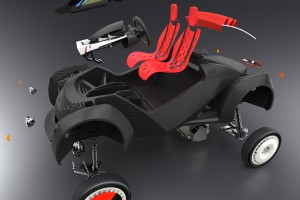Local Motors has taken the world’s first 3D printed car on tour and will display the Strati in downtown Knoxville.
The car that could change the world will take pride of place in Market Square in downtown Knoxville today at 10am. In some ways it is a homecoming. The company is based in Phoenix, Arizona, but a number of engineering students from the University of Tennessee were involved in a project that included hundreds of engineers around the world.
Lightweight and strong
The Strati is the world’s first fully 3D printed car and the lightweight machine, which has a chassis produced from carbon-fiber infused plastic. With 80% ABS plastic and 20% carbon fibres, it’s a simple and cost effective formula that the company now uses across its entire range.
Local Motors is one of the founding fathers of the 3D printed car. It and made the iconic Rally Fighter and a selection of other cars since its inception in 2007. Talk show host Jay Leno has one of the rally raid specials and it has become the poster child of 3D printed automotive applications.
A show stopper in Chicago
The Rally Fighter was an open source design and was largely 3D printed, but the Strati has taken the practice to a whole new level with a fully printed ‘tub’.
It was a joint project with Cincinati Incorporated and the Oak Ridge National Laboratory that took just 44 hours to print in front of an audience at the 2014 International Manufacturing Technology Show in McCormick Place, Chicago.
The name means ‘layers’ in Italian. It is made up of just 49 printed parts, compared to 5000-6000 separate components in a traditional car. The company believes the car is, effectively, ready to go and can be a production reality for $18,000-$30,000.
An urban commuter rather than a highway cruiser
The Strati can hit 40mph, which is more than enough for an urban commute, and has a range of more than 120 miles on a single charge. It is not certified for the highway, but then this could easily be an option for city use.
Forward thinking urban centers and even large company headquarters could even think about fleets of these cars that have no emissions, a low carbon footprint and real potential to change the world of automotive construction.
The Strati’s powerplant comes straight from the equally quirky Renault Twizy, but the beauty of a 3D printed car is that it can be adapted in any number of ways. The company made the Rally Fighter open source so that any designer with access to CAD programming could change the design to suit their specific needs.
A global car with open source
A customer in deepest Africa might want to install a diesel engine into the Strati, for instance, while the electric powerplant would work perfectly in downtown LA or London.
Local Motors is determined to build a 3D printed car that surpasses the Federal Motor Vehicle Safety Standards and Regulations in the next 12 months. Theoretically the strength of a 3D printed car means this should be easy to achieve, but then the company must undergo a set number of crash tests and there are a vast array of boxes to tick that go beyond basic collision tests.
The LM3D is the model that is most likely to succeed in crossing over to the mainstream and it’s got real potential. It might not displace the big names for a long time, but the boutique car market is blossoming and these cars do have a place.
Market Square, in Knoxville, for a start.



